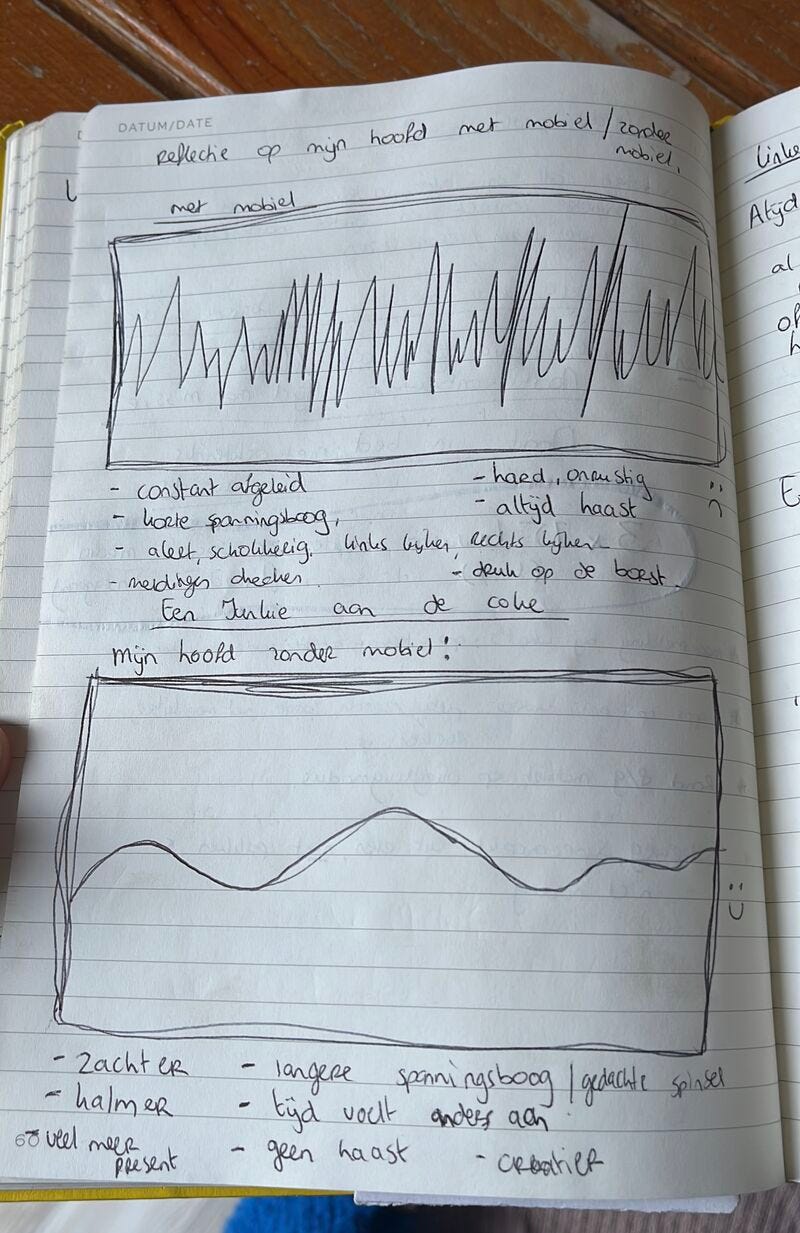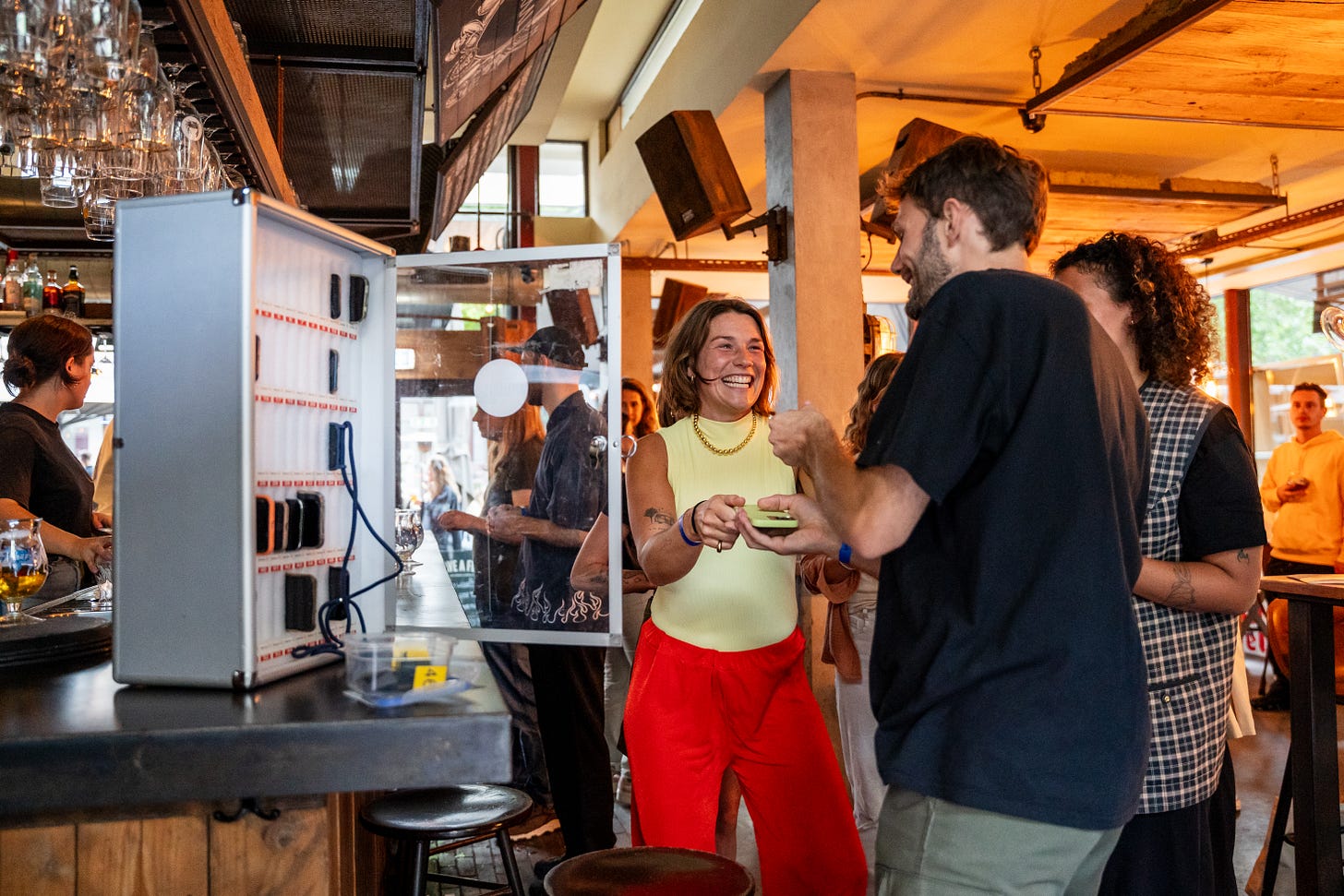Hey there dear reader,
For as long as I can remember, I’ve been "always on” - always connected, always responding, and constantly feeling the pressure to stay informed. Sound familiar? This was my reality until last year when I decided to take a bold step: I went completely offline for an entire month.
In this newsletter, I’ll be diving into the lessons I’ve learned from going offline for such a long period. Also, don’t miss the interview with Ilya Kneppelhout, the founder of the global movement ‘The Offline Club’ (that ironically went completely viral last year), who shares his insights on trusting your intuition and the power of disconnecting to reconnect. I think you will find his advice and journey truly inspiring.
Are you ready to take a break from the digital world? Let’s dive in.
Enjoy reading!
Love, Bibi ❤️
For as long as I can remember, I’ve been "always on." Always online, always connected, always responding to messages as quickly as possible, and always feeling like you “need” and want to stay informed about everything. Immediately checking your phone when your ‘dinner companion’ goes to the toilet. Relatable? This was my reality - until last year.
In 2023, I decided to turn off my phone for five whole days during the leadership retreat led by the incredible Carlijn Nelissen. Not long after, I went offline for 24 hours during an outdoor expedition I facilitated for OFFFFF, a slow adventure agency. What happened during those experiences was nothing short of transformative: the deep connection we felt with the other participants, the sense of timelessness, and a profound peace I hadn’t felt in years. That taste of being truly unplugged left me yearning for more.
Because, truth be told, my relationship with my phone was (and still is) complicated. I have rules—like not using it after a certain hour, or never checking it before breakfast. I’ve deleted Instagram, only to reinstall it again. Who hasn’t been there? But if I’m honest with myself, I had to admit: the addiction is real.
So, I wanted to go further. I wondered what would happen if I - someone who is always “on" - committed to being completely offline and unreachable for an entire month. It was a bold challenge, but I did it. Last year, I went offline for four weeks - once in January and again in September, during a holiday. For a full month, there was no WhatsApp, no Instagram (my biggest time-sink), no LinkedIn, no work emails, no news apps.
The result? It was an absolute celebration of peace, space, and emptiness. I felt a certain rest I never felt in my life before.
The first hours and days were weird and uncomfortable, and I kept asking myself over and over why I’d come up with such a crazy idea. But after this initial discomfort, I entered a new reality. I read books without distraction. When I had to wait for something, I drew pictures on the sidewalk with pebbles. Instead of scrolling on my phone while using the bathroom, I marveled at the tile patterns. I noticed the architecture of the buildings I was in, observed people with a clarity I hadn’t experienced before, and immersed myself in the nature around me. And when there was nothing to do, I allowed my mind to wander freely. Time felt different, and life was different.
“I got bored, I got inspired, and most of all, it felt like I was on a holiday from life.”
A whole new, beautiful world opened up to me - a world that’s still hard to put into words now that I’ve returned to the fast-paced, "always-on" digital world.
The drawing I made on the last day of the experiment still says it all. It was my way of capturing the profound shift I’d experienced. Maybe a month is a bit too long for some, but I encourage you to give it a try - just for a day. Even a single day offline can work wonders. Trust me, it’s amazing
The biggest life lesson of Ilya Kneppelhout (27) - founder of ‘The Offline Club’
On a sunny afternoon here in Portugal, I find myself on the phone with Ilya (27). It's been a little while since our first call last year, which was arranged by a mutual friend who knew we both shared a passion for "being offline." His calm, thoughtful manner made him easy to talk to, and there was something unique about him—he seemed different from most people his age. I had to know what it was. So, as I got to know him better, I asked him my favorite question, simple yet profound: “What is your biggest life lesson?”
Ilya paused, took his time, his gaze thoughtful. Then he said, “Follow your heart and intuition. It might sound cliché, but it’s the most important thing you can do. Your feelings guide you to the places and people that truly align with who you are. When you ignore them, you end up in situations that just don’t fit.”
Ilya’s journey to this realization wasn’t immediate. A few years ago, he worked at a company called MOYU - a job that, while enjoyable on the surface, didn’t fulfill him. “It was a great experience, and I had a fantastic time but something felt off. Sometimes your heart tells you to stop something, even if you don’t know exactly what to do afterward. So, I quit—without a plan,” he admitted, laughing.
The decision wasn’t easy. “Sometimes, closing doors is harder than opening new ones. But if you don’t let go of what doesn’t feel right, you’ll never make space for something better. In my opinion only by closing one door you can truly open another, ” he tells me.
Listening to Ilya, I was struck by his ability to articulate what so many struggle with: trusting yourself enough to stay close to your feelings no matter what others say. He shared an example: “When we launched our first ‘Reading Weekend’ - an offline retreat for people to read and connect - everyone doubted it. They said no one would show up, that it wouldn’t work. But it felt right to me, so I trusted that. And it turned out to be a great success.”
A cornerstone of Ilya’s lesson and vision - and his work with ‘The Offline Club - is the belief in disconnecting to reconnect. “One of the biggest sources of distraction is your phone,” he said. “Putting it away gives you the space to reflect, to think about what truly matters, and to reconnect with the things you’ve forgotten you love.” For Ilya, moments of offline introspection have been key to rediscovering passions or feelings. “When I take time offline, childhood dreams and forgotten desires resurface. It’s in that quiet space that I can really hear my feelings and decide what to do next.”
For Ilya, following his intuition also extended to his personal life. “I used to try activities and relationships because they seemed like they ‘should’ work. Sailing, for instance. My dad loved it, my friends loved it, but I didn’t. I realized tennis was more my thing - and that’s okay. The same goes for people. If someone doesn’t make you feel good, even if they’re a ‘friend,’ it’s worth questioning if they’re really right for your life.”
I ask him if he was never scared while making those decisions guided by the heart. “Leaving my full time office job, ending friendships or following new hobbies - it was terrifying at times. But fear is part of the process. There’s this exercise by Tim Ferris which I really like called ‘Fear Setting.’ Instead of setting goals, you define your fears. You ask: What’s the worst that could happen? How likely is it? And if it happens, how can I handle it? This helped me see that the price of staying still was far greater than the risk of taking a leap.” he tells me.
Ilya’s journey hasn’t just been about leaving things behind—it’s been about finding what lights him up. From following afro dance classes, and signing up for theaterclasses, to building the worldwide movement ‘The Offline Club”, every step has brought him closer to the life he wants and who he truly is. “When you follow your feelings, you meet the right people and experience success on your terms. It’s not always easy, but it’s worth it. The best part? It’s not just about career or hobbies. It’s about trusting yourself in every aspect of life. That’s when things truly start to align.”
Sitting across from him, I couldn’t help but feel inspired. It’s a reminder we all need: trust your heart, embrace the fear, and let go of what no longer serves you. Because on the other side of those closed doors is where the magic happens.
Some offline tips, ideas, recommendations and challenges:
#1. Write a letter to your phone. Put a timer on 15 minutes, put your phone away and don’t stop writing until the alarm goes off. Some advice for writing: write about what’s going on in your life, talk about your relationship with your phone. What do you like about it, what you don’t like. How do you want the relationship to be in the future? Can you find out when you use it a lot?
#2. Try to sometimes leave your phone at home, when you go for a walk for example or when you go to the gym. It’s soooo nice!
#3. Check out the events of ‘The Offline Club’ - they host offline events world wide to connect and where you swap screentime for real time.
#4. Ready for a 24 hour offline expedition in nature? Check out the page of OFFFF: a slow adventure agency.
#5. Watch the documentary of
called “Schermstrijd”. The series follows several individuals as they confront the challenges of managing their screen time and the pervasive influence of digital devices. It highlights the struggles of balancing online and offline life and the consequences of excessive screen use on mental health, relationships, and overall well-being. Highly recommended!#6. Read the inspiring book from Hans Schnitzler called “digital detox” . In this essay he explores the negative impact of technology and smartphones on our lives, encouraging readers to take time offline. The book highlights the benefits of reducing screen time, such as improved focus, peace, and personal connections, offering practical tips to find a balance between technology and real-life experiences.
*And now: put your phone away and enjoy everything around you!😍






